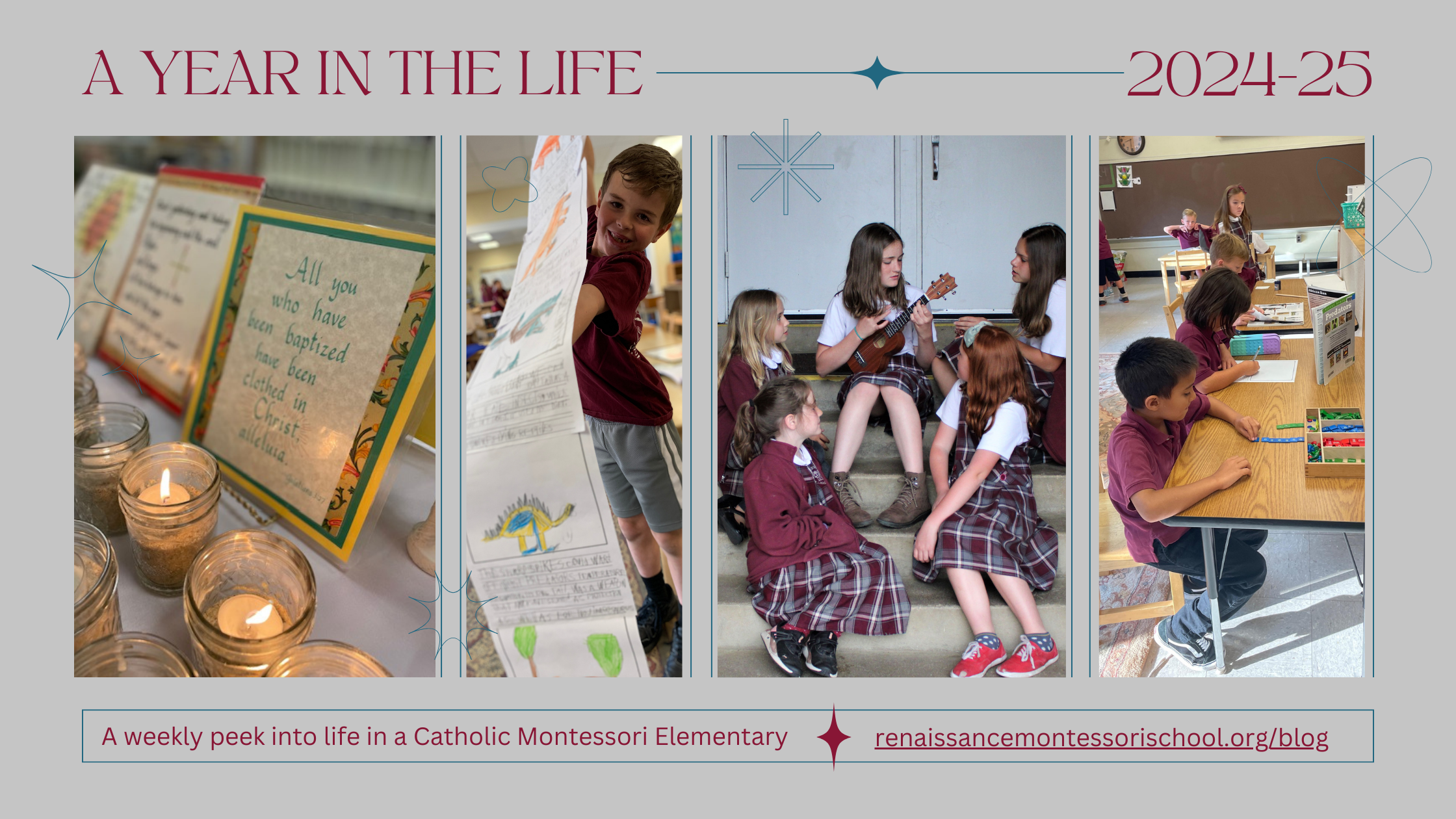As you may have read, I have been at home recovering from pneumonia, and since the last weekly update, my time with the elementary children has been brief and my knowledge of the classroom secondhand. While I meditated on what I could possibly have to tell you today, what immediately popped into my head was the concept of the teacher as a bottleneck and obstacle in the classroom.
Do not misunderstand me: the students have not been unsupervised in my absence. They have been in the classroom with Mrs. Mello, Mrs. de Bernardo, and Mrs. Blanchette, with Mrs. Dankoski joining to help out at recess. The students have had all the resources available to them they normally have. They are not in any sort of holding pattern, waiting for my return. What are they missing? Essentially, they are missing the one who gives them most of their new lessons.
While we can all agree that getting new lessons is a good thing, I think we can also understand that phenomenologically, a lesson can pop up as an unwelcome interruption. This feeling has many sources, and we should not judge it too quickly. It can surely come from a wanting of docility and obedience--a willfulness, perhaps. It can also come from a real and honest desire to keep doing the good work they are doing. Each of us who has done real work with our hands or with our mind knows the pain of being pulled out of a task with few natural stopping points.
With younger children, who receive more of their elementary lessons in smaller groups, we have a greater ability to catch them in between tasks. For older students, we might see ten students gathering for a meeting to discuss the distinction between cells, tissues, organs, systems, and organisms. If I was waiting for them all to be between tasks all at the same time, well, we might still be waiting for this presentation that I gave a month ago!
We make our peace with this in the classroom, though. Just as we cannot walk without wasting effort due to air resistance, to be together in the classroom is to accept this inefficiency. It is a cost of doing business. For this reason, sometimes I will draw a bottle of ketchup on the section of the board where we normally have our lesson schedule and announce a "catch-up day". (This type of silliness can really bring a group together, even if it is to scoff at a goofy pun.)
So what happens when there are a few unplanned "catch-up days" in a row? Behind the scenes, there is a lot of communication between me and the rest of the elementary faculty. Who is using their time well? Who needs some out-of-the-box work ideas to help inspire them? As always when the elementary faculty talks shop, children are not "good" or "bad". They are not problems to be solved. Rather, they are individuals who we are trying to inspire and introduce to topics and dynamics that will capture their imagination in some lasting way. And yet we are not relativists, nor are we airy sentimentalists. We are hard nosed experienced experimenters. We are trying out strategies and seeing what works.
One thing I noticed when I checked in with my staff, that there were never statements of "the class was this" or "the class was that". I was hearing about your individual children--what they were doing, what help they needed, and what lessons they are eager to receive when I am back.
Here are some other things I heard about:
When I came in for a half day on Friday (before the severity of what I was experiencing was known to me) I checked in with some older students when they returned from a field trip. One of them reported doing more work than they ever had in their entire life when I was gone. (Side note about the field trip: a lot of our older students visited the nearby Nokesville Winery to get some insight into how they cared for their grapevines, how they dealt with spotted lanternflies, and how grapes were turned to wine. Everyone had a wonderful time, and I got a very nice email from the man at the winery, who had never had to talk about his craft with 9 to 12 year olds before!)
One reason we focus so much on the virtue of our elder students is that their habits--whether they be work habits or habits of speaking--will migrate down to the younger folks in the classroom. One first year saw the upper elementary students (including his two older sisters) progress from a proposed idea of visiting a vineyard to the actual trip. He expressed his own desire to do that kind of work. His intended destination? The Air and Space Museum in Chantilly. In the time that I have been gone, this student has not just researched planes from different eras of history, he has collected a posse of three other students--some as old as 10--to help him with this research with an aim to see some of these planes in real life.
Now, when students begin one of these research projects, it is not every time that it reaches the fruition of a trip. There are many reasons for this. Sometimes a group or individual loses interest in the subject. Other times, their curiosity is sated by their in-class research. Listening from afar, though, this seems like a group of children that have that certain something that makes me think we will be looking at the schedule soon and writing permission slips and arranging transportation.
I am eager to return to the classroom and take up again the mantle of being the "guide on the side". I also look forward to seeing what other fruit there has been from this unplanned period in which the stars of the show have been the independent work of the children. This is the time this year that Maria Montessori would have been most proud of, I think. I think the Good Shepherd was uniquely interested in this period of time in our classroom too. The Lord wishes for each of us to develop our will so that we may independently choose the good, even when teachers and parents are far away. We hear in the Easter Vigil that "all time belongs to Him". Yes, this time has belonged to Him, even this time when it seems that the guide-on-the-side has fallen off the front of the stage.




